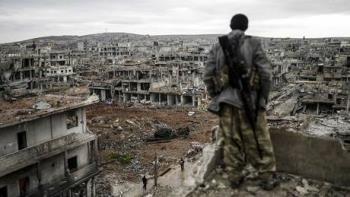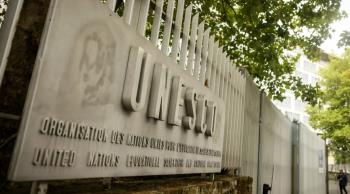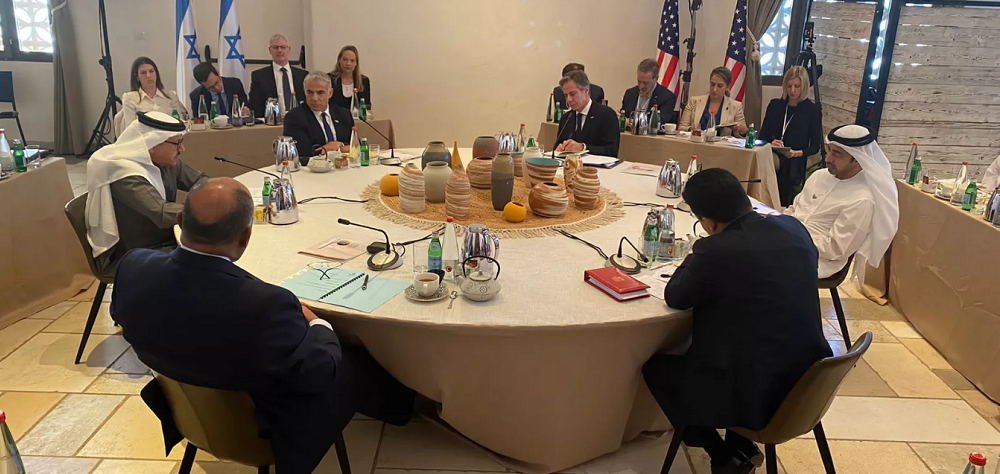Alwaght - The foreign ministers of Egypt, the UAE, Bahrain and Morocco attended a meeting on March 27, 2022 attended by Israeli foreign minister Yair Lapid and US Secretary of State Anthony Blinken in the occupied Negev. The Israeli Foreign Minister called the six-party meeting a historic meeting in which various political issues, especially the Iranian nuclear issue, were discussed.
The meeting came as US Secretary of State arrived in the occupied territories on March 26, 2022, to meet the regime’s premier Naftali Bennett, foreign minister Yair Lapid and Israeli War Minister Benny Gantz. Therefore, the recent six-party meeting can be considered as a fundamental initiative of the US. The question that presents itself is that what is the purpose of holding such a meeting, and what is the White House's motivation for its new initiative in the Occupied Territories?
Attempts to pull the failed normalization process out of recession
The composition of the actors present at the Six-Party Summit clearly indicates that Washington is basically planning to revive the failed process of normalization of Arab relations with the Zionist regime. The presence of the UAE, Bahrain and Morocco as the three main pillars of the process of normalization of relations with the Israeli regime, clearly indicates the fact that the stagnant process of normalization has been restored by the White House.
Washington's new attempt to revive the process of normalization of relations is in a situation where no other Arab country has entered this process after the initial process of accepting normalization by the Emirates, Bahrain and Morocco under Trump and under pressure from Washington. Saudi Arabia and some other countries’ refrain from joining this process clearly proves that the process of normalization of relations is suspended and Washington, despite its recent show, cannot achieve a special achievement in this regard.
Although the normalization of relations between the Arabs and the Zionist regime is from Washington's point of view an important step in maintaining the security of this regime, which is a pillar of US strategy in the region, but another important issue for Washington is forming regional coalition against Iran-led resistance axis and reducing burden of US responsibilities regarding security affairs in West Asia and the Persian Gulf.
Efforts to strengthen coalition building against Iran
As stated in the initial goals of the six-party meeting by the Israeli Foreign Minister, the 2015 Iran nuclear deal (JCPOA) and the issue of Iran's influence in the region has been one of the main topics of the meeting. The US is trying to bring the Arab axis closer to the Israeli regime with the tools of Iranophobia, in order to form a coalition against Iran’s influence in the region ants its allies Hezbollah, Hamas and Ansarullah.
With regard to the White House special program for the Arabic-Israeli alliance against Iran, it is important to note that such a plan is not fundamentally new, and has been pursued by Washington for decades, but has never been successful on the ground. At the time being, the US's daydreaming for forming a coalition against Iran can be considered a failure, because on the one hand, with the presence of countries such as Qatar, Oman and Kuwait, such a plan has remained a hollow slogan. On the other hand, the presence of allies such as Syria, Iraq, and Lebanon among the Arabs alongside Iran has, more than ever, thwarted the US plan. All in all, it seems that this meeting, apart from being a propaganda, can take a practical step towards what is called confrontation with Iran.
Washington's efforts to address the Israeli regime's continuing concerns
Another important aspect of the recent six-party meeting in the Occupied Territories was the US effort to address the Israeli regime's concerns about the possibility of reviving JCPOA in Vienna talks. Over the past few years, and especially in recent months, Israeli officials have spared no effort to counter JCPOA and thwart negotiations on a nuclear deal with Tehran. Tel Aviv’s efforts included a wide range of field actions, diplomacy, lobbying, and verbal opposition.
The US is now is seeking to reassure the Israeli regime that it is reducing its mandatory presence in the West Asian region. The catastrophic US withdrawal from Afghanistan, its lack of support for Ukraine against Russian military offensive, and its lack of US support for Saudi Arabia in the face of Ansarullah’s deterrent operations have raised concerns among Israeli leaders that Washington is no longer willing to spend more on supporting Tel Aviv regime. Therefore, it seems that on the eve of the finalization of the process of reviving JCPOA, Anthony Blinken, by traveling to the occupied territories and holding a six-party meeting, seeks to assure the israeli leaders that Washington will continue to support the regime if an agreement is reached in Vienna.
In the meantime, one of the most important problems of the Israeli regime is the resumption of reconciliation talks with Mahmoud Abbas, as well as the repeated threats of the Gaza-based resistance movements against the occupied territories due to the Israeli regime’s non-compliance with the Quds Sword ceasefire commitments. The presence of the US Secretary of State and his meeting with Mahmoud Abbas, the head of the Palestinian Authority, and talks with Egyptian officials, who are the main mediators between Hamas and Tel Aviv, are based on these issues.



























